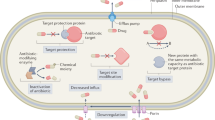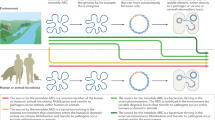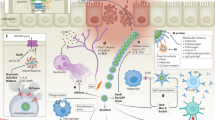Abstract
THE K88 antigen on the surface strains of E. coli which cause neonatal diarrhoea in piglets1,2 is an essential virulence determinant3,4 because its adhesive properties enable K88-positive strains to attach to piglet intestinal mucosa4–7 and establish in the small intestine4. These bacteria multiply to reach abnormally large numbers in the gut8 and synthesise enterotoxins that cause diarrhoea and death of infected piglets9,10. K88-positive bacteria, however, do not attach to intestinal tissue from all piglets, and at least two pig phenotypes occur6,7, which we have designated ‘adhesive’ (signifying that K88-positive bacteria attach to their brush borders) or ‘non-adhesive’ (K88-positive bacteria do not attach to their brush-borders). Phenotypes are the products of two alleles at a single locus which are inherited in a simple Mendelian manner7, and the phenotypes of progeny from selected matings support the conclusion that the product of the ‘adhesive’ allele is dominant over the product of the ‘non-adhesive’ allele (R. A. G., R. S. and J. M. R., unpublished).
This is a preview of subscription content, access via your institution
Access options
Subscribe to this journal
Receive 51 print issues and online access
$199.00 per year
only $3.90 per issue
Buy this article
- Purchase on Springer Link
- Instant access to full article PDF
Prices may be subject to local taxes which are calculated during checkout
Similar content being viewed by others
References
Orskov, I., Orskov, F., Sojka, W. J., and Wittig, W., Acta path. microbiol. Scand., 62, 439–447 (1964).
Sojka, W. J., Vet. Bull., 41, 509–522 (1971).
Smith, H. W., and Linggood, M. A., J. med. Microbiol., 4, 467–480 (1971).
Jones, G. W., and Rutter, J. M., Infect. Immun., 6, 918–927 (1972).
Wilson, M. R., and Hohmann, A. W., Infect. Immun., 10, 776–782 (1974).
Sellwood, R., Gibbons, R. A., Jones, G. W., and Rutter, J. M., Vet. Rec., 95, 574 (1974).
Sellwood, R., Gibbons, R. A., Jones, G. W., and Rutter, J. M., J. med. Microbiol. (in the press).
Smith, H. W., and Jones, J. E. T., J. Path. Bact., 86, 387–412 (1963).
Smith, H. W., and Halls, S., J. Path. Bact., 93, 531–543 (1967).
Smith, H. W., and Gyles, C. L., J. med. Microbiol., 3, 387–401 (1970).
Chandler, R. L., Derbyshire, J. B., and Smith, K., Res. vet. Sci., 10, 435–439 (1969).
Rutter, J. M., and Jones, G. W., Nature, 242, 531–532 (1973).
Rutter, J. M., Vet. Rec., 93, 165 (1973).
Jones, G. W., and Rutter, J. M., Am. J. clin. Nutr., 27, 1441–1449 (1974).
Freter, R., Infect. Immun., 6, 134–141 (1972).
Ellen, R. P., and Gibbons, R. J., Infect. Immun., 5, 826–830 (1972).
Author information
Authors and Affiliations
Rights and permissions
About this article
Cite this article
RUTTER, J., BURROWS, M., SELLWOOD, R. et al. A genetic basis for resistance to enteric disease caused by E. coli. Nature 257, 135–136 (1975). https://doi.org/10.1038/257135a0
Received:
Accepted:
Issue Date:
DOI: https://doi.org/10.1038/257135a0
This article is cited by
-
A multivalent vaccine candidate targeting enterotoxigenic Escherichia coli fimbriae for broadly protecting against porcine post-weaning diarrhea
Veterinary Research (2020)
-
Resistance to ETEC F4/F18–mediated piglet diarrhoea: opening the gene black box
Tropical Animal Health and Production (2019)
-
Travelers’ diarrhea: Modern concepts and new developments
Current Treatment Options in Gastroenterology (2006)
-
Disease resistance in farm animals
Experientia (1991)
-
Inheritance of K88-mediated adhesion of Escherichia coli to jejunal brush borders in pigs: A genetic analysis
Veterinary Research Communications (1987)
Comments
By submitting a comment you agree to abide by our Terms and Community Guidelines. If you find something abusive or that does not comply with our terms or guidelines please flag it as inappropriate.



